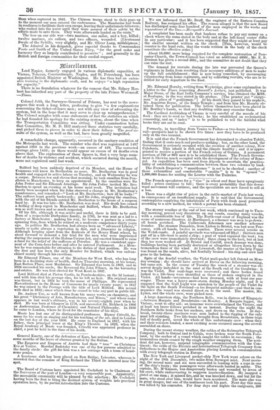Salford has been suddenly deprived of its Member, and the
House of Commons will know its Brotherton no more. Mr. Brotherton was in good health and engaged in active labour on Tuesday, and on Wednesday he was a corpse. Between ten and eleven that morning, he took omnibus from Pendleton to Manchester, to keep an appointment. In the omnibus were Sir John Potter and Sir Elkanah Armitage. Sir John Potter invited Mr. Brotherton to spend an evening at his house next week. The invitation had barely been accepted when Sir John observed a change in Mr. Brotherton's countenance, and remarked—" Look at Mr. Brotherton; how ill he looks I " The sufferer leant gently backwards ; and Sir John, stopping the omnibus, with the aid of his friends carried Mr. Brotherton to the house of a surgeon hard by. It was too late—Mr. Brotherton was dead. His death has caused a feeling of deep regret in Manchester and Salford, where Mr. Brotherton was so well known and so much respected. Of his life, although it was active and useful, there is little to be said. Born of a respectable Derbyshire family, in 1783, he was sent as a lad to a factory at Manchester : making his way, he became a partner in a cottonspinning firm, from which lie retired on a moderate competence thirty years ago. In politics Mr. Brotherton had always been an "advanced Liberal," nearly or quite always a vegetarian in diet, and a Dissenter in religion. Although keeping apart from the Radicals of the Henry Hunt school, he stood forward to demand a fair trial for the men who were imprisoned during the suspension of the Habeas Corpus Act, and exerted himself to raise a fund for the relief of the sufferers at Peterloo. He was a consistent opponent of the Corn-laws before and after he entered Parliament. As a Member he was remarkable for attention to the duties of that position. He was the first and has been the only Member for Salford, which was enfranchised mainly through his exertions.
Sir Edmund Eimer, one of the Members for West Kent, who has long been in a declining state of health, died on Thursday morning, at his house, East Sutton Place, near Maidstone. Sir Edmund was born in 1809, and in 1834 succeeded his uncle, the Reverend Sir John Fulmer, in the baronetcy and estates. He was first elected for West Kent in 1837.
Lord Milford died at Picton Castle, in Pembrokeshire, on the 3d instant ; and with him died his peerage also, for he left no heir. His original name was Grant, but in 1821 he took the name of Phillippa. He represented Haverfordwest in the House of Commons for nearly twenty years : in 1847 he was raised to the Peerage with the title of Lord Milford. His second wife died in 1852; since which time he ceased to take any part in public life.
Dr. Andrew Ure, so well known from his many works on chemistry, and Ids great "Dictionary of Arts, Manufactures, and Mines," and whose name appears in last week's obituary, was in his seventy-eighth year when he died. He was born at Glasgow in 1778, and succeeded Dr. Birkbeck in 1806 as Andersonian Professor of Chemistry and Natural Philosophy. In 1830 he came to London, where he lived for the remainder of his days.
Music has lost one of its distinguished professors. Signor Crivelli, famous for his work on singing and for his teaching of the art, died in London on the last day of the year 1856. Ile came to England in 1817, with his father, then principal tenor at the King's Theatre. In 1823, when the Royal Academy of Music was founded, Crivelli was appointed professor in chief, a post he held to the time of his death.




























 Previous page
Previous page